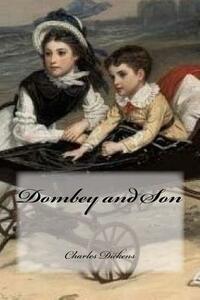Take a photo of a barcode or cover
I combined reading this marvel of a book with the audio version read by the incredible Mil Nicholson. An absolute pleasure.
Reading Dickens always reminds me that there was no such thing as an editor as we understand the function of an editor now. Dickens did carefully plot out his books — we have the evidence not only in letters but of his actual outline of how carefully this one was worked out. We can see through his letters where he deviated and where he stuck to the plot.
This is the first of his books that features a heroine rather than a hero at the center of the story. Florence, an unwanted daughter, is beneath her father’s notice. He ignores her lest he come to hate her (which he will do) in his disappointment over not having a son. When he gets the son, he is so elated that he scarcely notices the death of his wife.
Dombey's household, as well as his plans, are then organized around his little son Paul, who unfortunately is sickly. I think some of the best writing in the book is from Paul’s point of view, particularly when he is six years old. Carker's run was also amazing.
Strong but at times somewhat ham-handed are the descriptions of the train-building tearing up the English city and countryside: the first is the best, comparing it to an earthquake that has devastated a poor section of town. Equally interesting is the vivid depictions of a cram school and of who does the work when a grand wedding is set up, when a household goes into bankruptcy, and what goes on in the servants' part of the house.
I had some problems, as often happens with me and Dickens, with characterizations who are too obviously either Types to Make A Point, or caricatures. That's not to say they are all either Types or Caricatures. There are some brilliant characterizations, though exasperatingly enough, not all the main ones.
Mrs. Miff, who was only on stage for a few paragraphs here and there, was more interesting (and believable) than Florence, who is just too good and pure and deferential to be believed. Another great character was Miss Tox, the aging spinster who begins as a comic character as she secretly nurses her hopes of attaching the widower, encouraged (or so she believes) by Mrs. Chick, Dombey’s horrible sister, but attains dignity and greatness of heart.
Dickens is so good with comic secondary characters! Mr. Tootle, whose healthy progeny Dombey envies; Sol Gill; JB Bagshot, Miss Tox, Capt. Cuttle, Mr. Toots, and Susan Nipper. Mrs. Pipchin and the Blimbers come close.
Dickens does something interesting with the second wife, Edith, demonstrating what happens to women whose only choice is to marry. At least, I think the idea was interesting, but Dickens drags the situation on to excruciating lengths, repeating the same points in long melodramatic scenes. The villain comes on stage softly, and could have been interesting, but Dickens tips his hand by having the good and pure characters repelled by him by instinct. If only truly evil people really did have a warning aura about them!
I applaud Dickens for attempting the women's POV, but his heroines have no agency--all the more noticeable when I consider that the magnificent Becky Sharpe, in Thackeray's Vanity Fair, came out at exactly the same time.
That reminds me: I enjoyed little glimpses of the past. In Dickens' eyes, the Regency period was raffish and tarnished at best, as we see in a risible character whose shoulder and back are exposed, at the dinner. (Dickens is not kind to older women dressing young, even, as this one did, in the fashions of her youth, vis. the Regency gown.) Actually, Thackeray does the same, in Vanity Fair, which is set around the time of the Regency, with the big set piece at Waterloo. Not a pleasant depiction at all!
All in all, a good read, which could have been a great read if the repetition, preaching, and near-death Victorian conversions had been tightened way, way down.
This is the first of his books that features a heroine rather than a hero at the center of the story. Florence, an unwanted daughter, is beneath her father’s notice. He ignores her lest he come to hate her (which he will do) in his disappointment over not having a son. When he gets the son, he is so elated that he scarcely notices the death of his wife.
Dombey's household, as well as his plans, are then organized around his little son Paul, who unfortunately is sickly. I think some of the best writing in the book is from Paul’s point of view, particularly when he is six years old. Carker's run was also amazing.
Strong but at times somewhat ham-handed are the descriptions of the train-building tearing up the English city and countryside: the first is the best, comparing it to an earthquake that has devastated a poor section of town. Equally interesting is the vivid depictions of a cram school and of who does the work when a grand wedding is set up, when a household goes into bankruptcy, and what goes on in the servants' part of the house.
I had some problems, as often happens with me and Dickens, with characterizations who are too obviously either Types to Make A Point, or caricatures. That's not to say they are all either Types or Caricatures. There are some brilliant characterizations, though exasperatingly enough, not all the main ones.
Mrs. Miff, who was only on stage for a few paragraphs here and there, was more interesting (and believable) than Florence, who is just too good and pure and deferential to be believed. Another great character was Miss Tox, the aging spinster who begins as a comic character as she secretly nurses her hopes of attaching the widower, encouraged (or so she believes) by Mrs. Chick, Dombey’s horrible sister, but attains dignity and greatness of heart.
Dickens is so good with comic secondary characters! Mr. Tootle, whose healthy progeny Dombey envies; Sol Gill; JB Bagshot, Miss Tox, Capt. Cuttle, Mr. Toots, and Susan Nipper. Mrs. Pipchin and the Blimbers come close.
Dickens does something interesting with the second wife, Edith, demonstrating what happens to women whose only choice is to marry. At least, I think the idea was interesting, but Dickens drags the situation on to excruciating lengths, repeating the same points in long melodramatic scenes. The villain comes on stage softly, and could have been interesting, but Dickens tips his hand by having the good and pure characters repelled by him by instinct. If only truly evil people really did have a warning aura about them!
I applaud Dickens for attempting the women's POV, but his heroines have no agency--all the more noticeable when I consider that the magnificent Becky Sharpe, in Thackeray's Vanity Fair, came out at exactly the same time.
That reminds me: I enjoyed little glimpses of the past. In Dickens' eyes, the Regency period was raffish and tarnished at best, as we see in a risible character whose shoulder and back are exposed, at the dinner. (Dickens is not kind to older women dressing young, even, as this one did, in the fashions of her youth, vis. the Regency gown.) Actually, Thackeray does the same, in Vanity Fair, which is set around the time of the Regency, with the big set piece at Waterloo. Not a pleasant depiction at all!
All in all, a good read, which could have been a great read if the repetition, preaching, and near-death Victorian conversions had been tightened way, way down.
emotional
reflective
sad
slow-paced
Plot or Character Driven:
A mix
Strong character development:
Yes
Loveable characters:
Complicated
Diverse cast of characters:
No
Flaws of characters a main focus:
Yes
Read this for uni, or I likely would never have read it. I get what was being said, but the book was depressing and long. Okay, I'm just going to say it, I don't like Dickens.
Read this for uni, or I likely would never have read it. I get what was being said, but the book was depressing and long. Okay, I'm just going to say it, I don't like Dickens.
slow-paced
Loved Les Mis, and want to read something similar set in Victorian England but with a shitty dad? Look no further. Dickens’s story telling is unmatched, but these characters (except Susan and Florence) were entirely too unpleasant.
emotional
reflective
sad
slow-paced
Plot or Character Driven:
A mix
Strong character development:
Yes
Loveable characters:
Yes
Diverse cast of characters:
No
Flaws of characters a main focus:
Complicated
I discovered the work of Charles Dickens quite late, in adulthood, and it took me several years to let myself be entirely caught in the net of its charms. However, today, having read many of his novels, I consider him a brilliant storyteller with a singular verb, and I am determined to read his fictional work in its entirety.
"Dombey and Son" is not Charles Dickens's best-known novel; it is far from it. However, its thousand pages contain a lovely family and social fiction that his contemporary Victor Hugo will doubtless not have disdained. All the ingredients make a Dickensian novel an extraordinary universe of shattered destinies and colorful figures.
A novel of vanity and ambition, "Dombey & Son" denounces the greed of the heart, the pretension of class, the manipulation of beings, and the harshness of a society that does not spare those in need. With unique humor, Charles Dickens deploys this talent that belongs only to him to give life to a massive gallery of characters to eat in both senses.
I don't know of any other period author capable of featuring many leading and supporting characters, nimbly interlocking them with each other, and giving them a personality of their own, endearing or repulsive. Likewise, each actor in this beautiful drama searched and worked in-depth until he offered the reader the best of his qualities or faults. The result is such a closeness to the ordinary heroes and heroines of the novel that we, the readers, feel ourselves becoming one of them.
Charles Dickens did not in any way usurp his status as a beloved author of the English Language, and I am one of his great admirers.
"Dombey and Son" is not Charles Dickens's best-known novel; it is far from it. However, its thousand pages contain a lovely family and social fiction that his contemporary Victor Hugo will doubtless not have disdained. All the ingredients make a Dickensian novel an extraordinary universe of shattered destinies and colorful figures.
A novel of vanity and ambition, "Dombey & Son" denounces the greed of the heart, the pretension of class, the manipulation of beings, and the harshness of a society that does not spare those in need. With unique humor, Charles Dickens deploys this talent that belongs only to him to give life to a massive gallery of characters to eat in both senses.
I don't know of any other period author capable of featuring many leading and supporting characters, nimbly interlocking them with each other, and giving them a personality of their own, endearing or repulsive. Likewise, each actor in this beautiful drama searched and worked in-depth until he offered the reader the best of his qualities or faults. The result is such a closeness to the ordinary heroes and heroines of the novel that we, the readers, feel ourselves becoming one of them.
Charles Dickens did not in any way usurp his status as a beloved author of the English Language, and I am one of his great admirers.
Story Rating 7/10 Christian Faith Rating 1/3
Other than the unrealistically quick resolution towards the end, this is truly one of Dicken's most expansive works.






